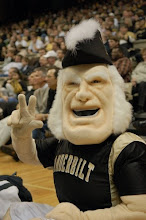Vanderbilt baseball coach Tim Corbin and ESPN's Buster Olney, a Vanderbilt grad and former Nashville Banner baseball beat writer, spoke yesterday at the Comcast Spotlight First Pitch Luncheon as part of the Nashville Sports Council 's Comcast Spotlight Sports Speaker Series.
While admission to the luncheon, held at the Wildhorse Saloon in downtown Nashville, wasn't cheap ($25) for non-members like myself, it was well worth it. I had the chance to meet Buster, and I learned that he did not end up graduating from Vanderbilt until he was 24 since he had difficulties paying his way through school. What kept him going? Writing, of course.
And that's the biggest piece of advice he had for aspiring journalists: just write as much as you can.
Corbin and Olney spoke about the state of baseball and then answered questions from audience members. Here are a few of the highlights:
– Olney shared a priceless story from his Nashville Banner days. The Columbus Clippers (then the Yankees' AAA-affiliate) and their high-profile outfielder Deion Sanders were in town. Sanders was not well-liked by his teammates, particulatly because of the special perks the Yankees gave him (such as letting his girlfriend travel with the team) to persuade him to switch over from football.
Anyways, Olney tried unsuccessfully to interview Sanders, who looked right through him and refused to answer any questions. And so Olney wrote a column, one that he says now was probably a bit too harsh.
At batting practice before the next game, a clubhouse kid approached Olney and said that "Prime Time" wanted to talk to him in the clubhouse. Olney, who was 5'8'', 150-pounds at the time, wisely advised the kid to tell Deion to come out to the field to ensure that a fight couldn't break out.
Nothing happened until the fourth inning, when the clubhouse kid handed Olney a baseball from Sanders with the following message: "Write like that your whole life and you'll always be a loser."
Olney, who has never asked for autographs from players, said that it's the only ball in his collection. "My only regret is that he didn't sign it," he said.
Just classic.
– At the end of spring training, Olney said that he always asks players what they saw that jumped at them. This year, guys like Derek Jeter and Jorge Posada said, "David Price." The one inning he pitched against the Yankees in which he struck out the side and hit 99-mph on the radar gun clearly had them impressed. Olney also mentioned that players wrapped up their interviews to watch Price pitch. That's quite the praise for the former Commodore.
– As a beat writer for the Nashville Sounds (Nashville Banner), San Diego Padres (San Diego Times-Union), Baltimore Orioles (Baltimore Sun) New York Yankees (New York Times), Olney said gained an appreciation for just how resilient players have to be to make it to the big leagues. "You understand how hard it is and how much resiliency it takes," he said. "You have to have that hope every day."
– Corbin came to Vanderbilt after serving as an assistant coach at Clemson. "I didn't know I was going to become a head coach to be honest with you," he said.
– On his team's success over the past couple of seasons, Corbin said modestly, "Good players make coaches look good."
– On the difference between Vanderbilt and other schools, Corbin pointed to Dominic de la Osa, who turned down a contract from the Detroit Tigers to return for his senior season. "If that's a Clemson kid, he goes out," Corbin said. "At Vanderbilt, they like money, but not that much. Degrees mean a lot to these kids."
– Olney commented on how today's players communicate with one another differently. For example, as soon as Clay Bucholtz pitched a no-hitter last season, Yankees rookie Joba Chamberlain sent him a text message saying, "Glad you got that out of your system."
– Olney said that once Major League Baseball felt comfortable with its Tampa Bay and Florida franchises, it would look to expand in cities such as Las Vegas, and possibly even Nashville.
– As a Hall of Fame voter, Olney said he would put Mark McGwire, Barry Bonds and Roger Clemens in without question. "Unless you separate who did it what, you can't single out players," he said. "The only difference between McGwire and others is that they haven't been named by Jose Canseco...I have a hard time demonizing a handful of guys for an industry-wide problem."
Olney added that Commissioner Bud Selig deserved a measure of the blame, and expressed his frustration with the Mitchell Report. He said that while it gives 80 names, the report was not within context, and failed to mention what was being said about steroids in the higher-level meetings, among owners and the Players Association, for example.
– Olney said it would be a long time before Pete Rose gets in the Hall of Fame.
– Corbin said that he doesn't see a decrease in baseball's popularity, citing the large number of showcases and prevalence of hitting coaches as example. "Parents are also more involved," he said, "which is not the best thing in the world."
– However, Corbin added that baseball needs to do a better job getting minorities involved in the game at a grassroots level. "It's becoming a sport where you need money to play and that's not right," he said.
– Olney said that four season tickets behind home plate at New Yankee Stadium will cost $810,000 annually, which is $25,000 per seat per game. How's that for a bargain?
Wednesday, April 16, 2008
Subscribe to:
Post Comments (Atom)





No comments:
Post a Comment